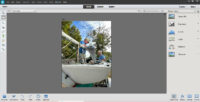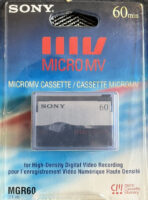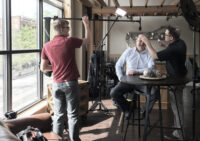What you need to know
Ready or not, all American TV will be digital starting on Feb 17, 2009. We hope this page will answer some of your questions.
Analog TV Has Served Us Well, But…
Many of us still have analog television service. Analog is how TV has been transmitting signals since it began. See The Birth of Television. As great as it is, analog TV has a few problems.
It is susceptible to interference or “snow” that degrades the picture. Analog TV also uses a lot valuable bandwidth spectrum. TV stations can only transmit one channel of programming with an analog signal versus up to four or more programs with a digital signal in the same amount of spectrum.
Digital TV Is Coming Soon to A TV Near You
After February 17, 2009, all TV stations must stop analog broadcasting and broadcasting exclusively in a digital format called DTV. Congress mandated the conversion to all-digital television broadcasting, also known as the digital television (DTV) transition, because all-digital broadcasting will free up frequencies for public safety communications (such as police, fire, and emergency rescue). The law is called the “Digital Television Transition and Public Safety Act of 2005”. (this link give you the pdf summary of this congressional act including the money set aside for the government-financed conversion box coupons for the American public)
Why Move To Digital
Congress mandated the conversion to DTV for two important reasons. First, Digital TV provides higher quality picture and sound and it allows more programming options via multiple broadcast streams. Second, stopping analog broadcasting free up a wide range of frequencies so they can be used for public safety such as police, fire, and emergency rescue communications, as well as commercial uses. Digital does not use as much of the bandwidth spectrum as analog TV.
What About Your Current TV
If you subscribe to cable or satellite, your access to broadcast channels should not change. However, if you currently rely on over-the-air signals via an analog television and an antenna on the roof or set-top rabbit ears, you will need to act to continue to receive television. You must either:
- Purchase a low-cost converter box to use with your existing analog television
- Purchase a digital television that can receive DTV signals
- Subscribe to cable or satellite
Analog-only TVs should continue to work as before with cable and satellite TV services. Some existing analog TVs already have digital tuners so read your TV manual or check the manufacturers web site before you assume you need to replace your TV set.
You may already have digital TV from your cable or satellite company
For more information on these ensuring you have the equipment needed for the digital transition, please visit the following sites:
- Buying The Right TV: What Every Consumer Should Know
- DTV Answers : How do I switch to DTV?
- FCC: Digital Television is Coming
How To Get A Low Cost Converter Box
In order to help consumers with the digital transition, the federal government has created a coupon program that will significantly reduce the cost of a set-top box. The coupons will be redeemable at select retailers.
To learn more about the coupon program, including how and when to request your coupons, coupon value, and redemption instructions, please visit Digital-to-Analog Converter Box Coupon Program.
Call a toll-free number, 1-888-388-2009 (1-888-DTV-2009), for an update.
What Will Happen If You Do Nothing
If you do not receive your signal via cable or satellite and do not have a television with a built-in digital tuner or set-top converter box, your television will not work on February 18, 2009 and later.
Don’t Wait
If you wait till the last minute, it may become harder to make the jump. There could be millions of people trying to do the same thing you are. That could be time-consuming and more expensive.






All the information provided is true. But the con sid of the coin was never discussed. If you watch TV off the air keep in mind that the signal because of frequency is subject to reflection off clouds and leaves and even the wind blowing can cause loss of signal. Unlike analog signals You either have a digital signal or you don’t. I do not believe in cable. I don’t need or want 150 channels with still nothing to watch. The public needs to look at the hard earned cash.